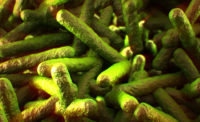Researchers Examine Listeria monocytogenes Tolerance to Sanitizers

Researchers at the University of Georgia are studying the risk of Listeria monocytogenes developing a tolerance to sanitizers, with a specific focus on fresh produce production plants.
The project, titled “Possibility, duration and molecular predictors of sanitizer tolerance in Listeria monocytogenes, is examining the potential for resistance to chlorine and quaternary ammonium compounds. The research will evaluate how different sanitizer levels and lengths of exposure affect the degree of tolerance in selected Listeria strains. Listeria monocytogenes is often responsible for foodborne outbreaks.
Xiangyu Deng, Ph.D., with the University of Georgia, hopes his research project will help the industry make more informed decisions about the need for chemical rotation to fight Listeria. Ultimately, he hopes their results lead to a genetics-based tool to assess the risk of Listeria developing sanitizer tolerance.
Read more in the original article.
Looking for a reprint of this article?
From high-res PDFs to custom plaques, order your copy today!








